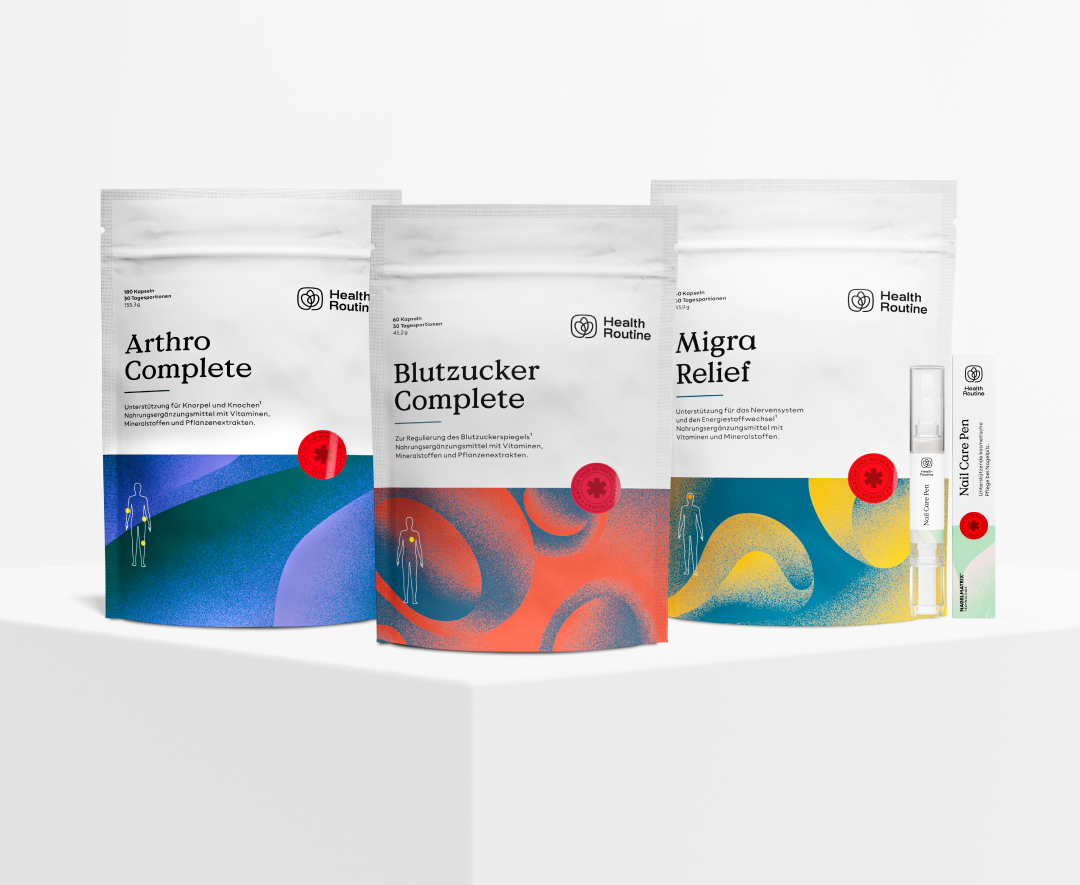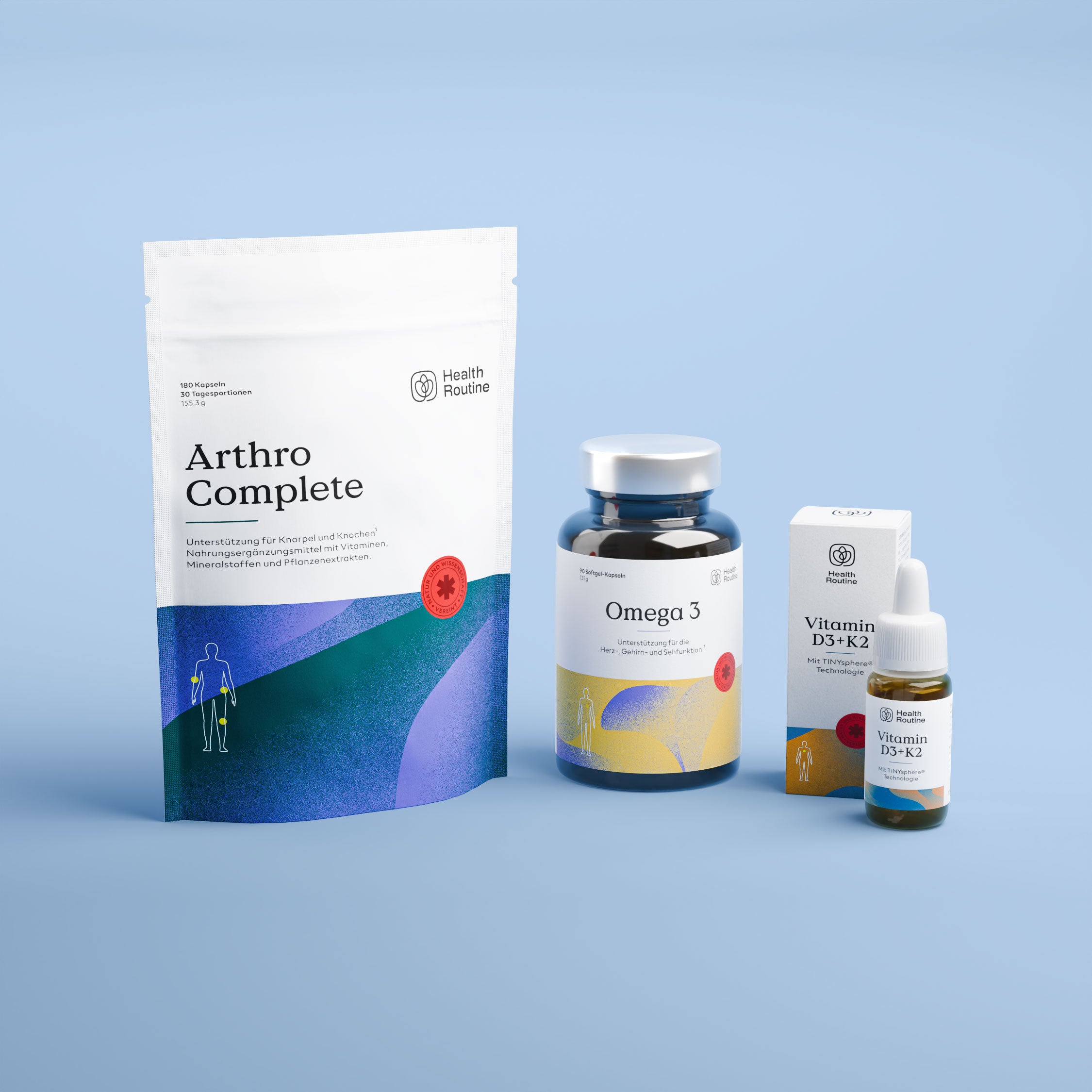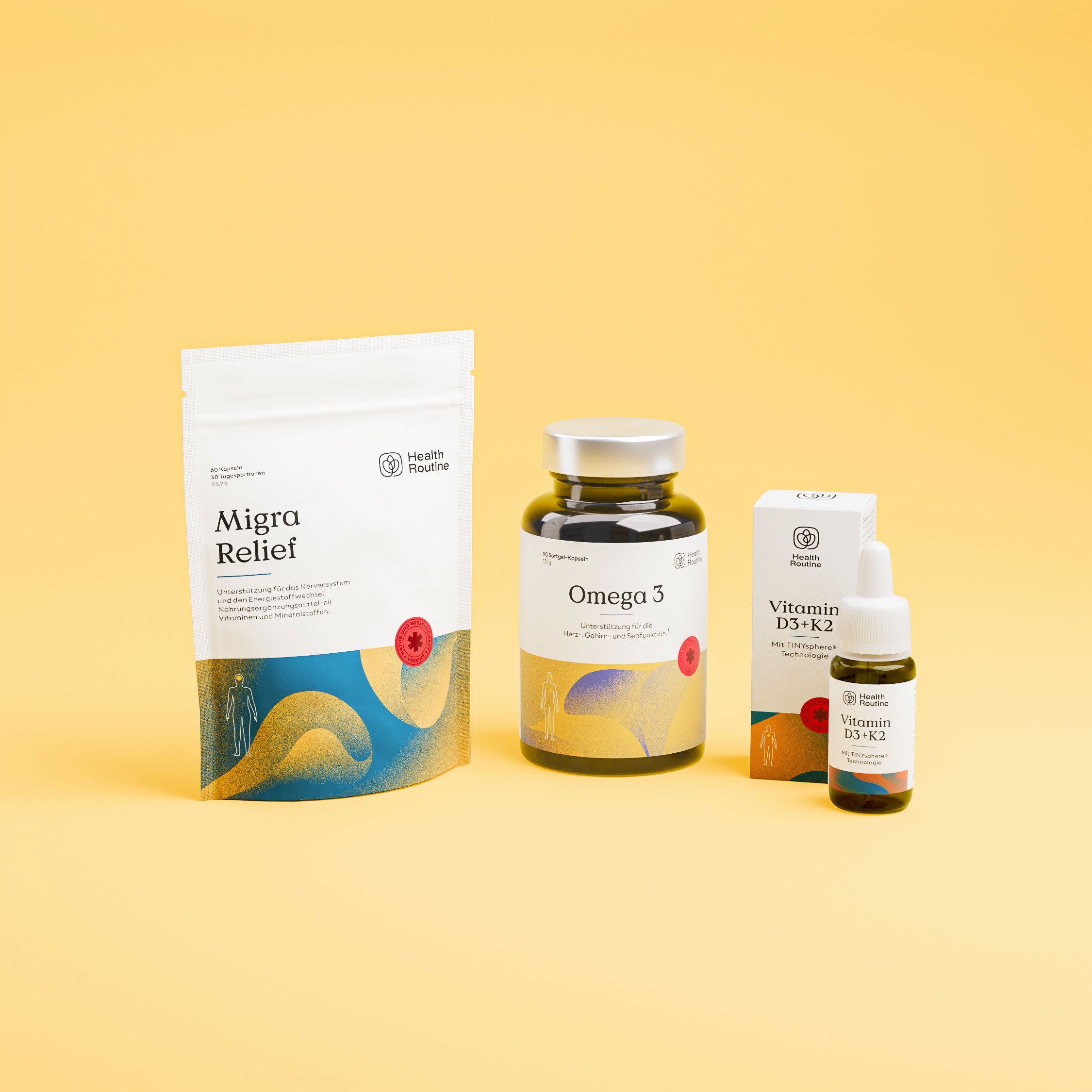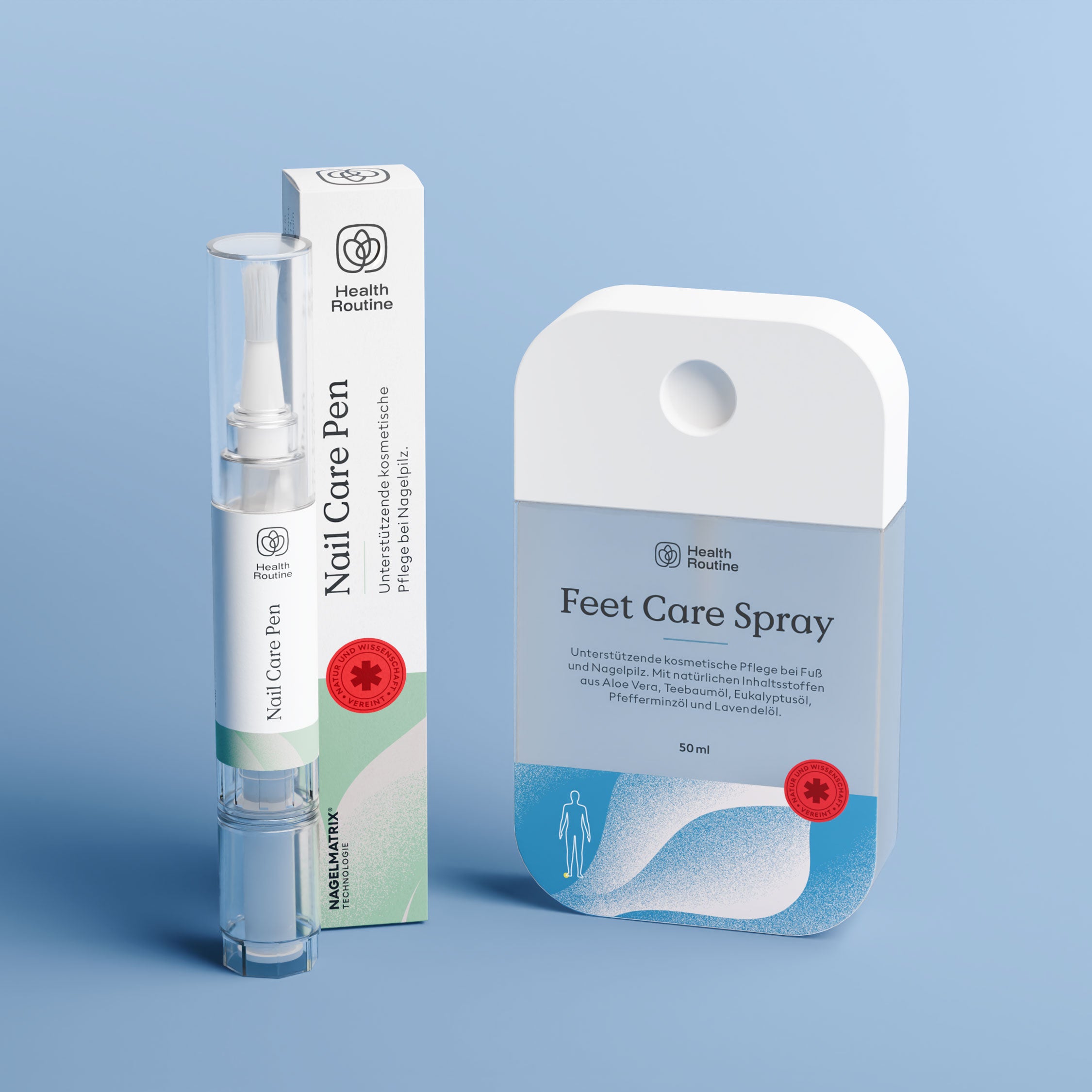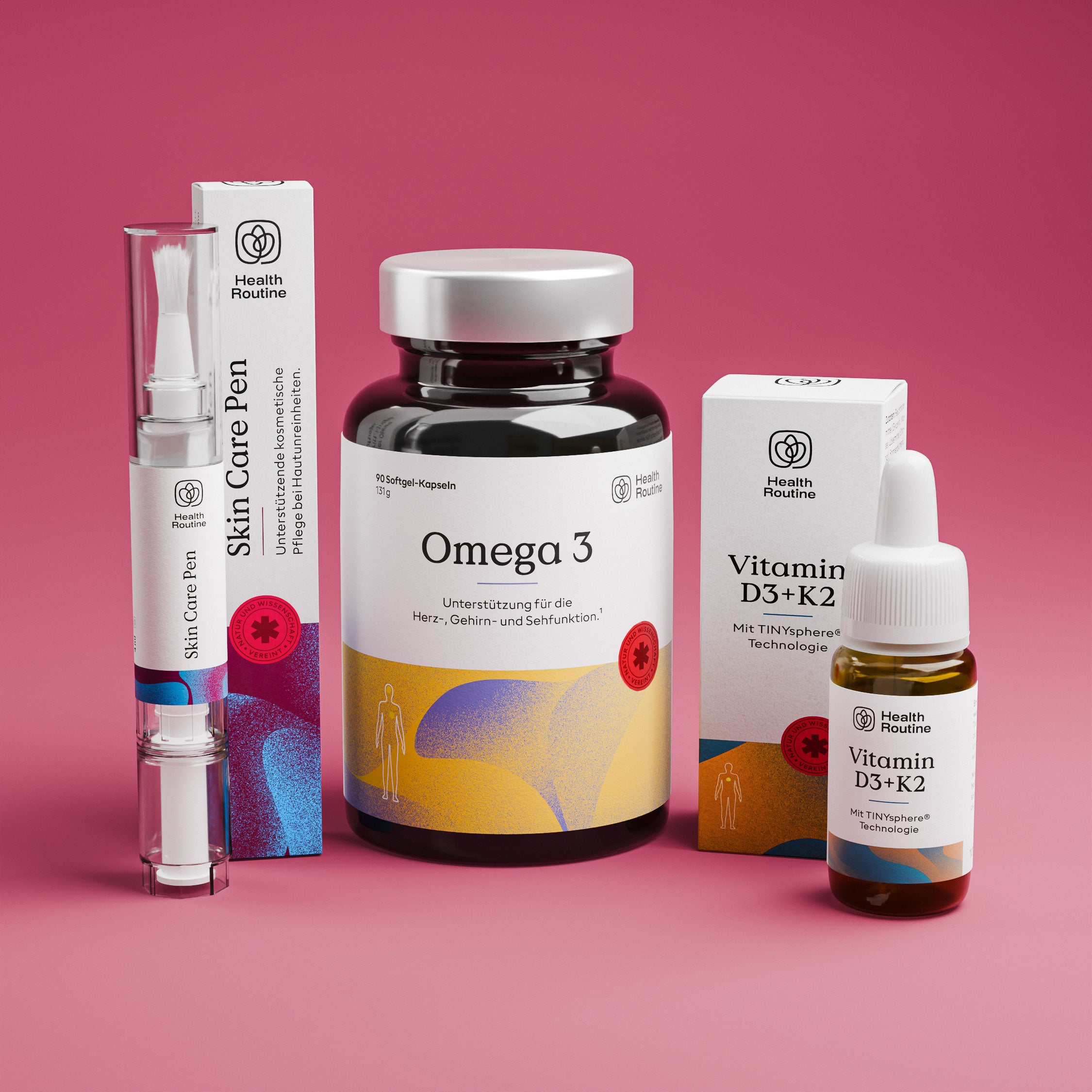The most important things at a glance:
- You will learn which foods can promote your skin health.
- You will learn about the dietary habits of many people with sensitive skin.
- You will receive practical tips for a sustainable change in diet.
- You will discover how the Health Routine Skin Care Pen Supports your skin care.

Inibisce piccole infiammazioni
Ideale per imperfezioni della pelle
Supporto cosmetico per brufoli e acne
Basics of skin health
The skin is the body's largest organ and reflects internal health. It performs essential functions such as protection from external influences , temperature regulation, and the perception of stimuli.
A balanced diet plays a key role in this process – it influences the various layers of the skin. Nutrients such as vitamins, minerals, and antioxidants contribute to normal skin function and protect cells from oxidative stress .
Foods for flawless skin
A balanced diet plays an important role in maintaining normal skin function. Fruits, vegetables, fish, nuts, seeds, legumes, and whole grain products, in particular, provide valuable nutrients essential for radiant and resilient skin .
We deliver:
- Fruits and vegetables , a variety of vitamins and antioxidants.
- Fish is an excellent source of omega-3 fatty acids, which contribute to normal heart function - a plus for general well-being.
- Nuts and seeds contain important minerals such as zinc, selenium and vitamin E.
- Legumes provide the body with high-quality protein and fiber.
- Whole grain products promote good digestion, which also has a positive effect on the skin.
Food groups at a glance
|
Food group |
Important nutrients |
Influence on the skin |
|
Fruit & Vegetables |
Vitamins, minerals, antioxidants |
Protection against free radicals, cell regeneration |
|
Fish |
Omega-3 fatty acids |
can support moisture |
|
Nuts & Seeds |
Vitamin E, zinc, selenium |
Supports cell renewal and oxidative stress |
|
Legumes |
Protein, fiber, zinc |
can promote skin regeneration |
|
Whole grain products |
Fiber, vitamins B |
Improve digestion, |
fruit and vegetables
Fruits and vegetables are true all-rounders: They provide essential vitamins, minerals and antioxidants – components that protect against harmful environmental influences and can regenerate skin cells.
Fish
Fish, especially fatty varieties like salmon or mackerel, is rich in omega-3 fatty acids and a valuable addition to a balanced diet. These fatty acids are known to support a variety of functions in the body—including those related to the skin. Two fish meals per week are considered a recommended guideline.
Nuts and seeds
Almonds, walnuts, and flaxseeds are truly nutrient-dense and ideal as nutritious snacks. They contain vitamin E, selenium, and zinc, among other nutrients—micronutrients that perform many functions in the body and can also play a role in skin health.
Legumes
Pulses such as lentils, chickpeas, and beans are rich in plant-based protein and fiber—a great base for filling, balanced meals. They're not only ideal for bowls, curries, or salads, but also contribute to a healthy diet.
Their fiber content can naturally support digestion – a plus that can have an impact on overall well-being.
Whole grain products
Whole-grain bread, oatmeal, or brown rice provide the body with valuable fiber and B vitamins—a good choice for a balanced diet. Whole-grain products can help keep digestion flowing and provide long-lasting satiety. This often also has a noticeable effect on overall well-being.

Inibisce piccole infiammazioni
Ideale per imperfezioni della pelle
Supporto cosmetico per brufoli e acne
Foods that can worsen skin problems
Not all foods are beneficial for the skin. Certain foods should be avoided , especially if you have skin problems like acne or eczema:
- Sugar and sweets that promote inflammation.
- Alcohol , which dehydrates the skin and promotes redness.
- Processed foods and fast food with numerous additives.
- Nicotine , which impairs blood circulation in the skin and leads to premature aging.
Nutrition for skin imperfections
Nutrition and skin are closely linked – many people notice that certain foods can have a positive effect on their skin.
Diets with a low glycemic index and a focus on fresh, unprocessed ingredients are particularly popular. However, the individual impact can vary greatly – so it's worth paying careful attention to what's good for your body.
acne
A diet rich in sugar and dairy products can promote the development of acne. A balanced diet with fresh fruits, vegetables, and whole grains can help soothe skin.
Experts recommend reducing fatty and sweet foods and instead opting for zinc-rich foods such as pumpkin seeds.
Eczema
In cases of sensitive skin or skin reactions such as eczema, individual intolerances or allergic reactions may play a role. Some people incorporate probiotic foods such as kefir or sauerkraut into their diet to support their overall well-being.
So-called elimination diets – ideally in consultation with specialists – can also help to better identify personal triggers.
psoriasis
A balanced diet with a focus on certain foods can have a positive effect on overall well-being.
Foods such as fruits, vegetables, fish, flaxseeds, chia seeds, and green leafy vegetables are particularly good choices, as they contain important nutrients such as omega-3 fatty acids and antioxidants, which can help support the body's balance.

Inibisce piccole infiammazioni
Ideale per imperfezioni della pelle
Supporto cosmetico per brufoli e acne
Nutritional recommendations for specific skin types
The diet should also be based on individual skin types .
- If you have dry skin, it is important to drink enough fluids and include hydrating foods such as cucumbers and watermelon.
- Colored but oily skin often requires avoiding foods that are too fatty and dairy products to avoid inflammation.
A practical overview:
Checklist – Nutrition for different skin types
|
Skin type |
Recommended foods |
Foods to avoid |
|
Dry skin |
Water, cucumbers, watermelon, fatty fish |
Highly sugary snacks, alcohol |
|
Oily skin |
Fruits, vegetables, legumes |
High-fat and highly processed foods, dairy products |
|
Sensitive skin |
Green tea, berries, nuts |
Hot spices, highly processed foods |
The role of vitamins and minerals in skin health
Vitamins and minerals are essential for maintaining healthy skin.
The most important ones include:
- Vitamin A (500-900 µg/day): contributes to the maintenance of normal skin.
- Vitamin C (65-90 mg/day): contributes to normal collagen formation for normal skin function and to the normal function of the immune system.
- Vitamin E (15 mg/day): Has antioxidant properties and can help with oxidative stress.
- Zinc (8-11 mg/day): contributes to the maintenance of normal skin.
- Selenium (55 µg/day): Protects against free radicals.
These nutrients should, if possible, be obtained through a varied diet .

Inibisce piccole infiammazioni
Ideale per imperfezioni della pelle
Supporto cosmetico per brufoli e acne
Dietary changes for healthy skin
A balanced diet can significantly support overall well-being. The key lies in a balanced diet of fruits, vegetables, fish, nuts, legumes, and whole grains.
Here are some practical tips :
- Drink enough: At least 1.5 to 2 liters of water per day helps to hydrate the skin.
- Reduce sugar and alcohol: This reduces the risk of inflammation and premature skin aging.
- Incorporate more omega-3 fatty acids: Fatty fish and flaxseed support skin moisture.
- Rely on whole grain products: These provide fiber, which aids digestion and reduces inflammation.
An additional tip is to plan your daily meals in advance and have healthy snacks on hand. This will ensure your skin is continuously supplied with the necessary nutrients.
Conclusion
Fresh, radiant skin is achieved through a harmonious combination of internal nutrition and external care. Focus on fresh, nutrient-rich foods and reduce your consumption of sugar, alcohol, and processed foods.
With a targeted change in diet, you can specifically support your skin's appearance and contribute to a healthy radiance.
FAQs
What is good for the skin?
A balanced diet with plenty of fruits, vegetables, whole grain products, fish, nuts, and seeds ensures optimal skin nourishment. Adequate fluid intake and a reduction in foods high in sugar and fat are also beneficial.
Which vitamins are good for the skin?
Essential vitamins include vitamins A, C, and E, as well as minerals such as zinc and selenium. These support normal cell regeneration, collagen production, and protect against oxidative stress.
How do I get beautiful skin all over my body?
A healthy lifestyle with a balanced diet, sufficient exercise, enough sleep and stress reduction can help your skin nourish and glow from within.
Which foods are good for the skin?
Fruits, vegetables, fish, nuts, seeds, legumes and whole grains are ideal foods to provide the skin with important nutrients and protect cells from oxidative stress.
What to eat for clear skin?
Avoid foods high in fat and sugar. Instead, opt for fresh, natural foods and include regular meals that stabilize blood sugar levels.
🌿 Would you like to read more about facial care?
